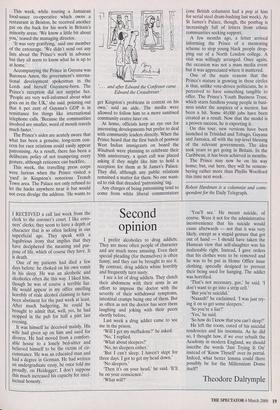Second opinion
I RECEIVED a call last week from the clerk to the coroner's court. I like coro- ners' clerks; they seem to have a depth of character that is so often lacking in our superficial age. They speak with a lugubrious irony that implies that they have deciphered the meaning and pur- pose of life, which of course they have. It is death.
One of my patients had died a few days before: he choked on his own vomit in his sleep. He was an alcoholic and alcoholics often die this way. I liked him, though he was of course a terrible liar. He would appear in my office smelling horribly of stale alcohol claiming to have been abstinent for the past week at least. After much badgering, he could be brought to admit that, well, yes, he had stopped in the pub for half a pint last evening. It was himself he deceived mainly. His wife had given up on him and sued for divorce. He had moved from a comfort- able house to a lonely bed-sitter and believed himself to be the victim of cir- cumstance. He was an educated man and had a degree in German. He had written an undergraduate essay, he once told me proudly, on Heidegger; I don't suppose this much increased his capacity for intel- lectual honesty. I prefer alcoholics to drug addicts. They are more often people of character and are much more amusing. Even their special pleading (for themselves) is often funny, and they can be brought to see it. By contrast, drug addicts whine horribly and frequently turn nasty. I see a lot of drug addicts. They clutch their abdomens with their arms in an effort to impress the doctor with the severity of their withdrawal symptoms, intestinal cramps being one of them. But as often as not the doctor has seen them laughing and joking with their peers shortly before.
Last week a drug addict came to see me in the prison. Will I get my meffadone?' he asked. `No,' I replied.
`What about sleepers?'
`No, no sleepers either.' `But I can't sleep. I haven't slept for three days. I got to get my head down.' `No sleepers.' `Then it's on your head,' he said. 'It'll be on your conscience.'
`What will?' `You'll see.' He meant suicide, of course. Were it not for the administrative inconvenience that his suicide would cause afterwards — not that it was very likely, except as a stupid gesture that got out of hand — I should have taken the Humean view that self-slaughter was his inalienable right. Instead, 1 gave orders that his clothes were to be removed and he was to be put in Home Office issue clothing, specially designed to prevent their being used for hanging. The addict was horrified.
`That's not necessary, guy,' he said. 'I don't want to go into a strip cell.'
`But you're suicidal.'
`Naaaahr he exclaimed. 'I was just try- ing it on to get some sleepers.'
`So you're a liar?'
`Yes,' he said.
`So how do I know that you can't sleep?' He left the room, cured of his suicidal tendencies and his insomnia. As he did so, I thought how, if we ever rebuilt the Academy in modern England, we should inscribe the words 'Just Trying It On' instead of 'Know Thyself' over its portal. Indeed, what better lemma could there possibly be for the Millennium Dome itself?
Theodore Dalrymple


































































 Previous page
Previous page